TC
Auto Added by WPeMatico
Auto Added by WPeMatico
Australian startup Ansarada, which provides tools for companies preparing for a major transaction, will expand in the United States, Europe, the Middle East and Africa after raising an $18 million Series A. The funding was led by Ellerston Capital, with participation from Tempus Partners, Belay Capital and Australian Ethical Investments. A noteworthy detail about the raise is that all advisory fees from the deal will be donated to Ugandan and Nepalese charities through Ansarada’s partnership with Adara Partners, a corporate advisory firm made up of financial services experts who donate their fees to help women and children living in poverty.
Ansarada provides data rooms, or secure virtual spaces that enable companies about to undergo a complex event or transaction, like a merger or fundraising, gather all relevant data and files in one place. This allows the process of performing due diligence, legal compliance, writing contracts and other tasks to go more smoothly and also lets companies track who accesses which documents. Ansarada’s clients have included some of the biggest names in tech and financial services, including Google, VMWare, Sony, Microsoft, Deloitte, PwC and KPMG. The Sydney-based company, which claims up to 80% of deals in Australia happen through its platform, will use its new funding for sales and marketing in its target countries, especially the United States, and on product development.
Other virtual data room providers include Firmex, Intralinks and Merrill Corporation, but Ansarada chief executive officer Sam Riley says one of its competitive advantages is its recently launched Material Information Platform (MIP), which serves as a complement to its data rooms. MIP uses machine learning and natural language processing algorithms trained with a dataset gathered from more than 20,000 transactions to give companies information that can potentially reduce deal risks and improve their ongoing business operations. These include an algorithm that Riley says is “up to 97% accurate by day 21 into an M&A deal at benchmarking a bidder’s behavior, scoring their engagement levels and predicting their likelihood to submit an offer and win.” It also scores the completeness of material information and tracks if risk and compliance requirements are being met.
“We’ve seen thousands of companies find out their biggest risks and opportunities too late in their life cycle, which prevents them from performing better pre-deal and ultimately getting less-than-ideal outcomes when they sell or raise capital,” Riley told TechCrunch in an email. He added “We define readiness as being able to express the value of your company very well and very fast, especially to an investor, advisor, auditor or any party that’s critical to success in your company’s most important events. Companies get control and visibility over their most important information and ensure improvement by scorecarding and assigning accountability to their management teams.”
As one would expect, Ansarada used its own products while raising its Series A.
“We eat our own ice cream, so even using the product for our own capital raise resulted in less time by our management team to prepare for the deal and more time spent executing our strategy,” said Riley. “We are now using the platform to give our board an objective score over how well our vital information and key risks are being managed. Simultaneously we are now ready for the next event on our calendar, which is likely to be a financial audit.”
Powered by WPeMatico
Microbiome therapeutics, Photoshop for augmented reality, and cancer treatments were some of the ideas presented at Day 2 of startup accelerator Y Combinator’s Winter 2018 Demo Day. YC is increasingly using its massive class size (141 startups this time around) to fund especially risky frontier technology and biotech moonshots, while tempering the portfolio with more predictable enterprise companies.
Investors say that valuations for post-Demo Day raises have risen steeply recently. Some speculate that people who made a fortune on cryptocurrency are trying to invest their returns elsewhere, driving up demand for YC startups.
The accelerator still admits many international copycats of U.S. successes, and YC is also repeating itself a bit. The Podcast App pitched the exact same product and strategy as Breaker, which debuted at YC exactly a year ago. But there were plenty of ambitious and unique businesses unveiled today on the Mountain View Computer History Museum stage, and the room was — as always — packed with a who’s who of tech investors.
Check out our coverage of all 64 startups that launched on the record yesterday, plus our picks for the top 7 companies from yesterday. (Tomorrow morning we’ll have our favorites from today.)
Here are the 60+ startups that launched at YC’s Winter 2018 Demo Day 2:

Callisto is a sexual misconduct reporting software built for victims.
The company’s product works by asking people who are looking to report a perpetrator to give certain unique identifiers, like a LinkedIn profile or phone number. If two victims name the same perpetrator, they are put in touch with each other and then with with an “options counselor,” a lawyer who can give them options on how to proceed in handling the situation. The company says that victims that visit Callisto’s website are 5x more likely to take action. They’ve started by rolling out their product on college campuses and are now taking donation from investors to roll out the service to the startup community.

Bump is a peer-to-peer streetwear marketplace.
It’s the “eBay for Generation Z.” They’ve been rapidly building an online community, and achieved $25,000 revenue on $430,000 GMV already in the month of March. They claim to be profitable and also have a user community that’s engaged. Bump says that 600,000 messages are sent be users for every week. They believe they can eventually move beyond streetwear.
Read more about Bump on TechCrunch here.
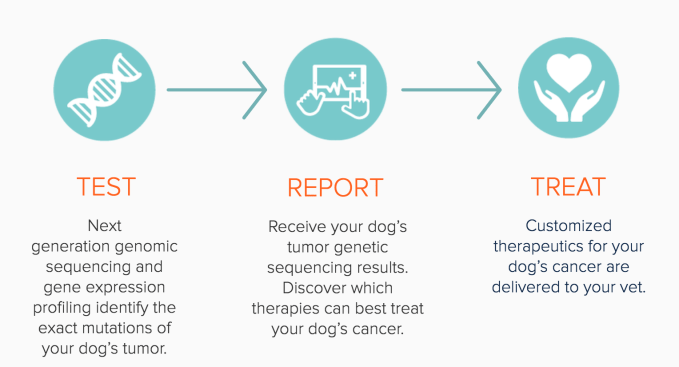
One Health wants to improve the treatment of canine cancer, using genomic testing and gene sequencing to improve diagnosis and the efficacy of treatments.
They are running currently 2 test pilots, where they’ve made $39,000 in about two weeks

Onederful is an API for dental insurance.
Onederful says dentists offices lose $6B in revenue per year due to insurance claim problems, and spend $3 billion a year on high friction claim verification. Onederful’s API integrates with 240 insurance providers to rapidly and reliably verify a patient’s insurance and make sure the dentist gets paid.
Onederful doesn’t have to sell dentist by dentist, and instead is developing partnerships with the top dentist software suites for distribution. It’s currently in 120 offices.

Anjuna protects applications running in the public cloud.
The company says that right now about 30 percent of workloads are in the public cloud, and their goal is to help migrate the other 70 percent. The startup is using its memory encryption technologies to protect applications while in use, at rest and in transit. The company claims it can keep them protected even if someone nefarious has root access to the host.

BioRender.io wants to standardize the “visual language of biology and the software to communicate it.”
They believe there’s a $11 billion market opportunity to eliminate “ugly science pictures. So far they’ve been working with 300 institutions, including SaaS businesses in the life science industries. Their work has also been featured in science journals.
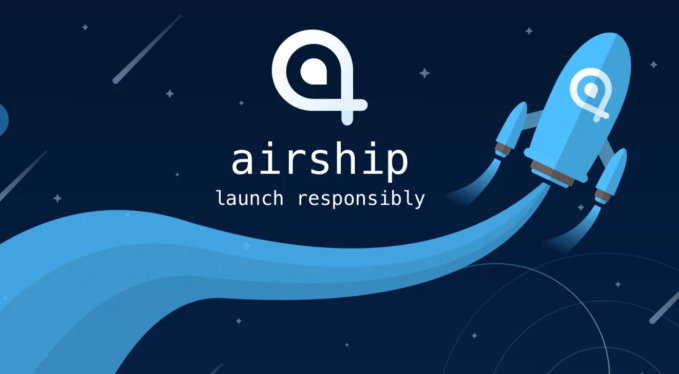
Airship is building a feature flagging framework that lets small startups roll out products the same way the the big tech companies do.
While A/B testing startups generally tackle small content changes like different headlines, Airship is letting customers ship entirely different features to swaths of users so that companies are more informed about how their audiences will react to redesigns or updates.
Read more about Airship on TechCrunch here.

Gainful makes personalized protein shakes.
Most protein shakes are designed for and marketed to male jocks and body builders. Gainful has customers take a five minute health quiz, then get personalized shakes delivered. 80K people have taken the quiz, building a huge health data archive for the startup. It has 2700 customers, with over half of whom buy a bottle. Gainful is growing 85 percent monthly with $40K in sales in February, and it’s profitable on each customer’s first purchase. Eventually, Gainful could expand into sports drinks, meal replacements, and personalized fitness plans utilizing the data its competitors aren’t collecting.

Quantierra sources real estate investments for developers.
It uses their database and algorithms to determine what can be built, its value, and the probability of it selling. Taking a 1.5% cut of any property they help sell, They’ve made $141,000 in revenue in 3 months, and say they have $310,000 in signed term sheets.

BloomJoy wants to be the “associated press for lifestyle content.”
They create and syndicate the content that they claim is currently seeing five million weekly readers in just a few short weeks. So far, they work with 19,000 publishers and have been generating $25,000 per week in ad revenue. It’s a $5 billion market opportunity, they believe. The team has a media background and previously sold a startup for $18 million.

YouTeam lets you “rent” engineers who work at consulting firms but aren’t currently doing anything.
The company takes a 20% cut of each job. They say they’re currently making $55k in net revenue per month.
Substack is a subscription publishing platform.
Subscription payments free journalists from relying on clickbait and sensationalism to get clicks and ad views. Substack lets any publisher or individual instantly launch a subscription product. Substack has 7,000 subscribers paying an average of $70 per year, and it takes a 10 percent cut. Its top writer now earns $300K. Eventually Substack wants to turn subscriber bases into communities, and expand into podcasts and video. With Kik’s CTO and a former journalist on its founding team, Substack wants to bring back the journalism revenue that’s slipped away to the social networks.
For more on Substack, read TechCrunch’s coverage here.

HelloVerify is doing online instant background checks in India where the the government has recently announced it will begin digitizing all personal records.
The startup has lined itself up to be among the first to take advantage of this legislation. The company currently has $3 million in annual revenue and has closed $1 million in orders in the past 60 days. The company’s early customers include Accenture, Infosys and Cognizant.
Look After My Bills is for people who want “lower bills with less hassle.”
The UK-based startup claims it can save users $320 per year by helping them manage energy, cell phones and broadband bills, by helping them switch providers and optimize for saving. They make $60 in commission every time a user switches businesses and have generated $84,000 so far this month from its 4000 users.
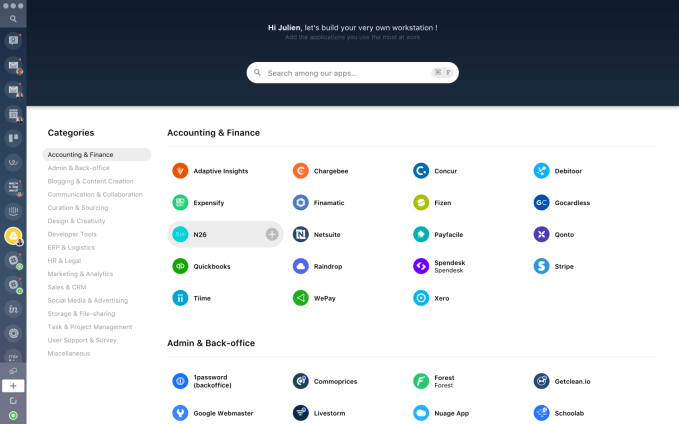
Station wants to be the app store of software-as-a-service by becoming the web browser people use while at work.
It bakes workplace apps into a sidebar on the browser for easy access that doesn’t see you getting lost in endless tabs. It’s integrated 500 different SAAS applications, with users downloading an average of 12. Station now has 11K weekly active users who spend more than 4.5 hours a day in the app. Eventually it wants to sell opportunities for deeper integrations to the big SAAS companies, and promotional discovery of their apps.

Torch want to bring executive coaching to entire companies.
The startup uses video-based conferencing software to help coach managers on skills that can help that improve. Managers can log in, set goals and track progress in Torch’s analytics dashboard. Torch was founded by a former executive coach and a data scientist. The team says that the startup’s revenue has been growing 45 percent month-over-month.

Edwin uses AI to teach English.
They say they can teach English in ⅓ of the time, at a ⅓ of the cost. You communicate with Edwin via Facebook Messenger or a voice assistant; on Facebook, for example, they have already obtained 757,000 users.
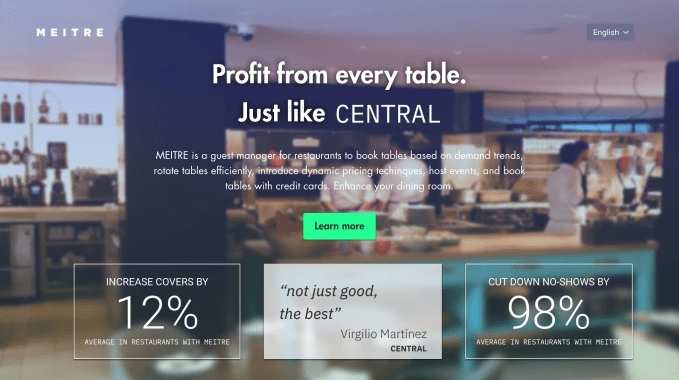
Meitre aims to be “Opentable for the world’s top restaurants.”
Focusing on the “top 3%” of restaurants that don’t have trouble getting reservations, Meitre says that instead of paying Opentable, they’ve found 55 restaurants that will pay them to reduce no-shows, sell more tasting menus and move demand to off-peak hours. This can result in “hundreds of thousands of more revenue each year,” they claim. So far, they haven’t had any customers churn and hope to expand to the estimated 50,000 restaurants worldwide that need this.

Pathrise helps train students to get better jobs in exchange for a percentage of their future salary via an income sharing agreement.
University career counselors are outnumbered by students 2900 to 1 on average, and their offices are outdated. First it learns about the student and uses data to surface relevant job openings. Its training can improve students’ cold emailing of recruiters, resumes, interview skills, and salary negotiations. It expects to earn $5K per student it gets hired. Starting with the 750K software engineering students, Pathrise sees a $3.75 billion market, and plans to eventually expand into other job types. Students spend a ton on their education, they scramble to get a job to pay back loans. Path rise could help them better leverage their schooling and find the right job for them.

TrapFi pays freelance developers for contributing to projects as soon as their pull request is approved, rather than waiting for a monthly check.
They charge 1.5% of earnings made on the platform; in 2 weeks, they say they’ve picked up 500 users and generated $25,000 in transactions.

Sixfold designs nanoparticles for treating cancer and other diseases.
They claim to be able to deliver gene editing drugs developed in CRISPR in a way that targets diseased cells without impacting healthy cells. They’re currently testing their nanoparticles in mice.

Jido Maps is an AR startup that’s approaching the problem of persistence, or getting digital objects to stay affixed to the real world environment even when the sensors aren’t there to observe them.
The company calls itself a “save button” for AR, allowing users to place objects, save them and share that information with other users. After one month of beta, 59 companies are using the startup’s API and will soon deploy it to their combined 300k monthly active users.

Justin Kan, formerly of Justin.TV and Twitch, announced a “tech-enabled law firm for startups.” called Atrium.
He said that through his experience co-founding and investing in startups, he had “become an involuntary power user of corporate legal services.” Estimating that there is a $158 billion market for outside spend on law firms, Kan believes that Atrium’s software will help turn legal documents into data. He says that his services are being used to save clients from hourly billing fees for contracts, M&A, blockchain and other paperwork. Atrium “makes legal services fast, transparent with upfront pricing.”

LUS makes haircare products for curly hair.
After decades of media pressure for people to straighten their hair, the public is now embracing curly hair. But managing it can require tons of expensive products and time. LUS makes products for specific curliness levels for a range of ethnicities. It bootstrapped its way to $1 million in sales a year selling $17 products. Gross profit is 70 percent, and the company has $400K in the bank. Now it wants capital to scale up to dominate the $50 billion a year curly hair product market with a brand that stands for “Love Ur Self”.
Read more about LUS Brands on TechCrunch here.
ZBiotics has made a genetically engineered drink that it says can prevent your hangovers.
The startup’s engineered probiotics break down acetaldehyde, one of the chief byproducts of alcohol metabolization that is thought to cause hangovers. Zbiotics says that when its product goes on sale at $5 per dose it will be the world’s first genetically engineered probiotic on the market.

Shogun helps companies quickly set up storefronts.
Small businesses looking to get off the ground and get their products online might be paralyzed by the sheer volume of stuff that needs to get done before a click-to-buy button even appears. Shogun wants to create a simpler workflow for a page editor to set up an online store on platforms like Shopify. The service is specifically designed with nontechnical people in mind.
Read more about Shogun on TechCrunch here.

DearBrightly offers personalized skincare prescriptions online.
Their primary product is a “retinoid”, which are used to help treat acne, psoriasis, and other inflammatory skin disorders. You send images of your skin to one of their partner dermatologists, you helps you establish a skin care regimen and get the necessary prescriptions.
Read more about DearBrightly on TechCrunch here.

Sketchbox is photoshop for AR and VR.
They believe that someday there will be just as many AR/VR designers as there are web and graphic designers today. So far, they’ve worked with over 2000 designers and found that the “power users” are spending an average of 3.5 hours per week on the platform. Companies like Microsoft, Oculus and Eon Reality have tested out Sketchbox. It’s a $6 billion market opportunity, Sketchbox believes.
Read more about Sketchbox on TechCrunch here.
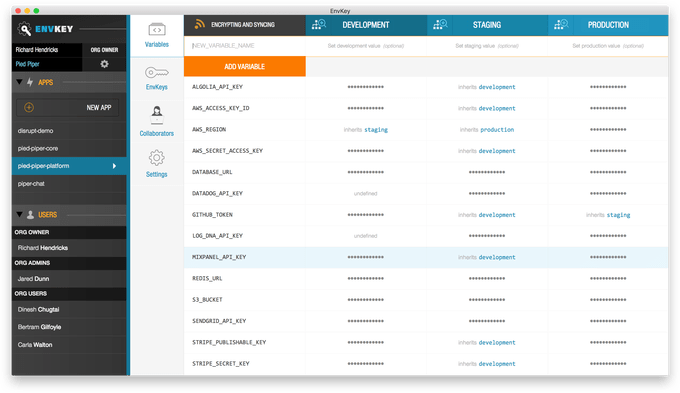
EnvKey wants to be the LastPass of API keys.
As companies get bigger and bigger, the complex network of tools and APIs they have to access might start to get out of hand really quickly. EnvKey is there to try to keep track of all those keys and secrets and make sure they get updated properly. EnvKey also has tools in place to make sure only the right people have access to them internally.
Read more about EnvKey on TechCrunch here.

Tradewind Bioscience is working on drugs that block the spread of cancer.
Its two founders both independently identified a cancer protein that occurs during the metastasization of cancer and chose to team up to tackle the problem. They’re focusing first on ovarian cancer, though they say that their therapies will work with “most” cancers.
Read more about Tradewind Bioscience on TechCrunch here.

Arrow wants to build Instagram for augmented reality.
Its app lets users attach text and emojis to real world objects and share videos of their AR creations. Its Autoemoji identifies common objects and facial expressions, and fills the screen with related emoji. The startup expects the number of modern AR-enabled phones to grow to 500 million in 2019, expanding its potential user base. Arrow’s public beta has seen 25K videos shared in 2 months. Building a new social content feed will be very difficult in the face of Instagram and Snapchat, but the autoemoji feature is innovative.
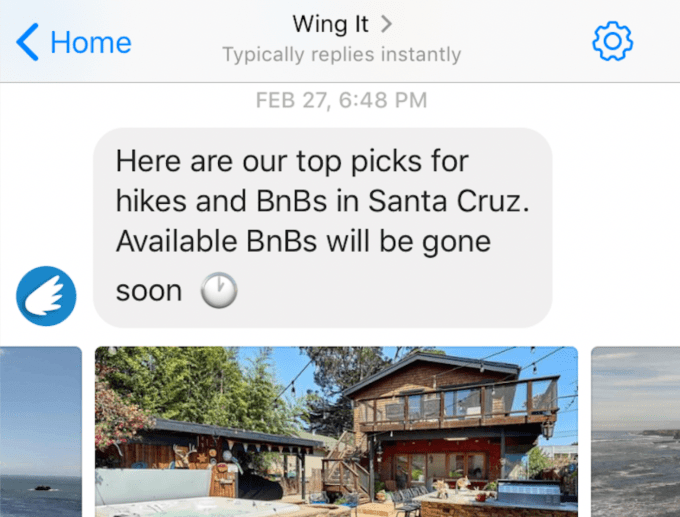
Wing It is a Facebook Messenger bot that tries to get you out of the house on a weekend trip.
It recommends AirBNBs, local hikes, and other activities based on your preferences — things like distance from home, cost per person, etc. They’re currently seeing 70% weekly engagement from their existing users.
Read more about WingIt on TechCrunch here.

Tipe is a tool for developers that takes needless text out of their lives.
The startup makes it easier for developers to navigate code without have to constantly make content edits on the behalf of marketing, by enabling non-developers to make these changes quickly and easily.

As our own Jon Shieber wrote here, “Swayable was founded by three former physicists to help craft political messages that actually inform and persuade rather than simply incite and propagandize.”
They aim to help political groups a/b test their messaging to determine what messaging works best, while only sharing information that is accurate. They currently have $100k in monthly books, with customers including the DNC, and the ACLU
Read more about Swayable on TechCrunch here.

Quantstamp automatically checks smart contract security.
The new popularity of the blockchain has led to more enterprises using smart contracts. But manually checking their security is time consuming and expensive. Last year $300 million was compromised due to smart contract hacks. Quantstamp has developed an automated process that scans smart contracts for vulnerabilities.
It’s already earned $2.4 million in revenue doing six enterprise smart contract audits, and it has 50 customers in the pipeline who’ll pay $500K per audit. Quantstamp could take smart contracts mainstream by making enterprises confident they won’t get hijacked.

Glimpse is trying to cut ineffective spending at schools.
The company meshes education institutions’ accounting systems with student achievement data to help education institutions understand what they’re pumping money into and see where they’re getting the best return on investment when it comes to positive student outcomes. The team’s ultimate goal is to “fundamentally changing the way $800B is spend in education each year.”
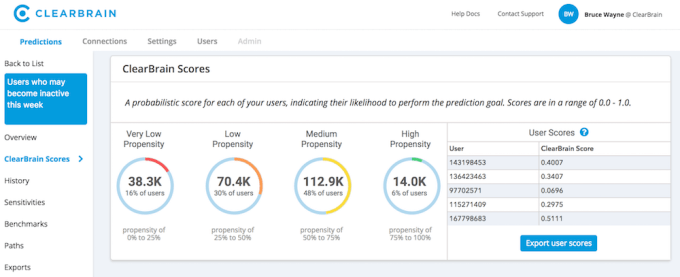
ClearBrain helps companies target ads at the users most likely to sign up for a subscription, buy a product, or cancel their account (for example).
It pulls data from the tools that businesses are already using (like Segment, Optimizely and Heap), then deploys artificial intelligence to analyze and group users based on how likely they are to perform a specific action. The ultimate goal, according to CEO Bilal Mahmood, is “to democratize AI for marketers.”
Read more about ClearBrain on TechCrunch here.

Players’ Lounge is an online platform where gamers can compete for cash.
Players can deposit money into their account and then search for other players who are willing to throw down a few bucks over a game of FIFA or Fortnite. The startup’s rating system lets gamers know if they’re taking on someone with a similar skill set or are out of their league.The company takes 10 percent of wagers and says they are growing 25 percent week-over-week.
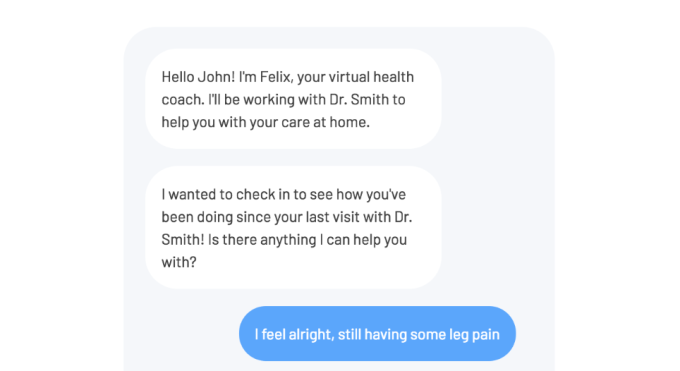
Memora Health is “building a virtual nurse for patient follow-up.”
It turns out that every time someone leaves a doctor’s office, nurses are getting paid to follow up with the patient about treatments. Memora aims to automate that interaction using artificial intelligence. So far they’ve achieved $70,000 in monthly recurring revenue and have $3.8 million secured in LOIs. They say they’ve “built the infrastructure to follow up with every single patient in the United States.”

Treasury Prime makes APIs for banks.
Most banks still run on old mainframe computers and manual changes, leading to delays for banking services. Treasury Prime says its can accelerate the process of opening a bank account from 3 days to 3 minutes. The startup is building APIs for checking balances and transaction history, sending and receiving money by ACH and wire, and more.
It now has a live integration with a bank that’s issuing real bank accounts with Treasury Prime’s API. With a team that built APIs for Silicon Valley Bank and Stripe, and who sold a previous company for $200 million, Treasury Prime wants to modernize banking.
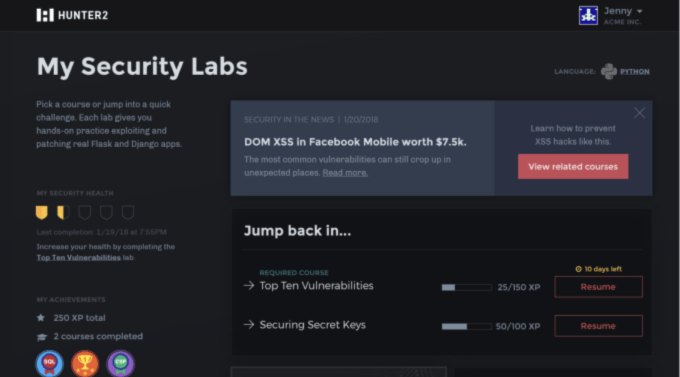
The moment a massive breach happens, Hunter2 hopes to already have a lab demo online for engineers to practice on.
Hunter2 serves as a tool to train engineers to better handle web app security through a soft-touch approach, giving employees semi-regular reminders of what skills the need and then having exercises build around real-world experience like the Equifax hack.
Read more about Hunter2 on TechCrunch here.
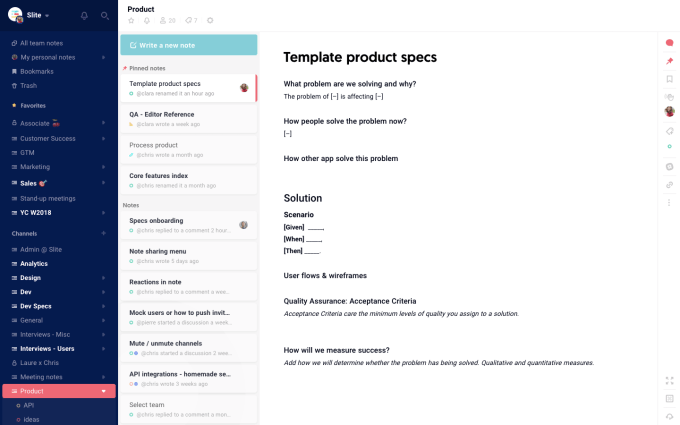
Slite is trying to reimagine collaborative tools for teams.
Imagine if Google Docs were developed by someone at Slack. Google Docs is already a pretty simplistic experience, but Slite aims to create a set of collaboration tools around a traditional notes application. The goal is to create a kind of hub where teams can come in and drop notes, ending up with something similar to an internal wiki.
Read more about Slite on TechCrunch here.
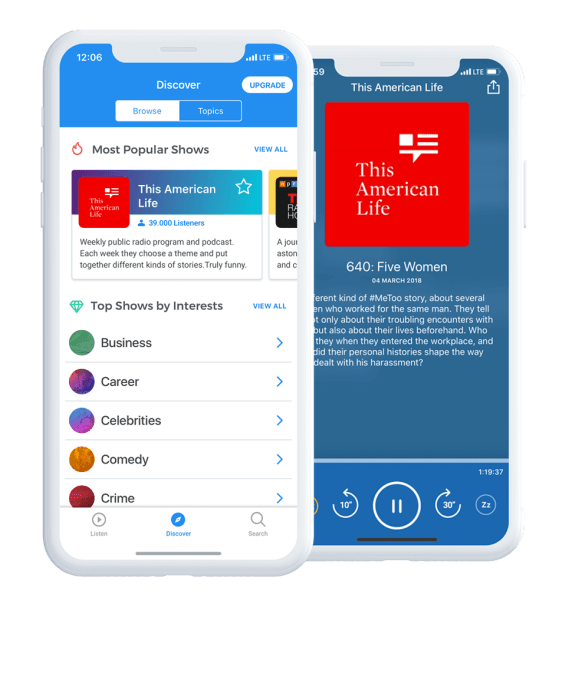
The Podcast App wants to be the Netflix for…podcasts.
With 500,000 shows and 30 million episodes out there, The Podcast App helps people listen to spoken audio content, but eventually wants to move into discover and exclusive content subscriptions. The company expects there to be 500 million monthly podcasts listeners in five years, and wants to get 10 percent of them to pay $10 per month for exclusive access to top creators. The Podcast App has grown 50 percent month over month for a year, and now has 40,000 daily active users. But it will have to rise above a legion of other podcast apps, including previous YC startup Breaker which has the same strategy.
Read TechCrunch’s full coverage for more on The Podcast App

Groww wants to be the Robinhood for India.
The company says that while there are 250 million people in the middle class in India, only about 10 million of them are investing online. The startup is beginning its efforts with mutual funds, earning a 1 percent commision on transactions. Next the company is looking to take on stocks, bonds and cryptocurrencies.

Persephone Biome is trying to retune the gut microbiome to help cancer drugs work. They’re making a pill that contains gut bacteria.
They expect to go into clinical trials in 2019.
Biobot Analytics analyzes city sewage “to estimate opioid consumption.”
Currently, “the best data is counting people who die,” which isn’t enough to help cities make predictions. The MIT-experienced founders said they are “passionate about using our skills to tackle the biggest drug crisis in American history.” So far they’ve received 17 letters of interest and believe this is a $1.5 billion per year market opportunity in the U.S. and Canada alone. In addition to drug use, they hope to also measure pharmaceuticals, infections disease and food consumption. This is “data that companies would pay billions for.”
Nectome aims to preserve people’s brains, for when and if scientists ever develop a method to upload your memories to a computer.
The catch (as explained by co-founder Robert McIntyre) is that the method is “100 percent fatal” — the company’s plans involve terminally ill patients, under anesthesia, to a heart lung machine that will pump embalming chemicals into their arteries.
Read more about Nectome on TechCrunch here.
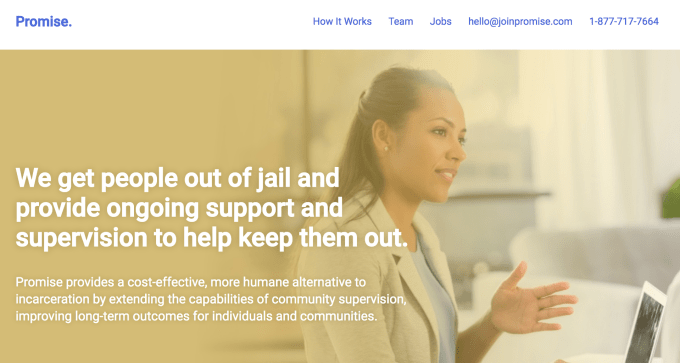
Promise is a bail reform startup, offering counties and local governments an alternative to holding low-risk people behind bars simply because they can’t afford bail.
For each participant, Promise provides counties with a comprehensive intake procedure and then sets up each participant with a care plan specific to them. Promise will then monitor and support participants by helping them ensure they know when they’re supposed to appear in court, and remind them of obligations like drug testing or substance abuse treatment needed. The app also provides participants with job training, housing, counseling and referrals.
Read more about Promise on TechCrunch here.
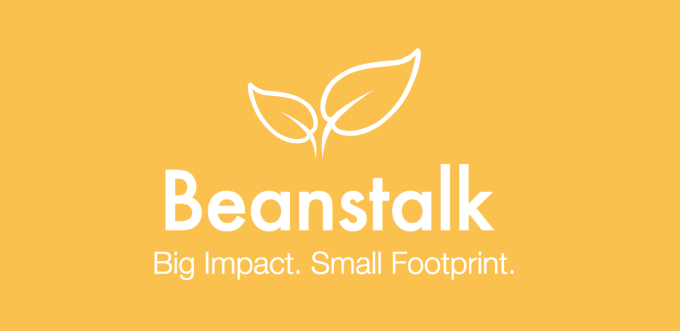
Beanstalk is an indoor farming startup that can grows produce at the cost of outdoor farming.
The company simplifies operations while reducing cost with its own custom machinery that takes on some of the high-cost areas for outdoor farming. Beanstalk holds some advantages, namely they don’t have to worry about weather and don’t need pesticides. They’re focusing on heirloom greens like spinach to grow to start and are focused on customers within 100 miles of where they’re growing.

Nutrigene makes personalized supplements based on your own health data.
Users upload their 23andme (or similar) data, and they try to create tailored supplements accordingly. Eventually, they intend to move into personalized medicine. They’ve say they’ve made $17,328 in revenue since launching 2.5 months ago, with a margin of 50% per order.
Read more about Nutrigene on TechCrunch here.

Precious is an iPhone app that uses AI to curate your baby photos.
It “scans that mess and finds the meaningful moments,” they said on stage. So far they’ve gotten 54,000 paying monthly subscribers and “create and update the perfect album for every child as they grow.” Using specialized AI, it determines what it thinks are the best photos and sends them to customers regularly. So far they say they have $180,000 in monthly recurring revenue and are profitable. They believe this is a $20 billion market opportunity.

Zyper wants to “re-create social networks for brands”.
It identifies a brand’s most engaging users, and offers them rewards relevant to the brand’s products (not money) in exchange for posting content about that brand. The company says they’ve made $1m in revenue since launching 9 months ago.
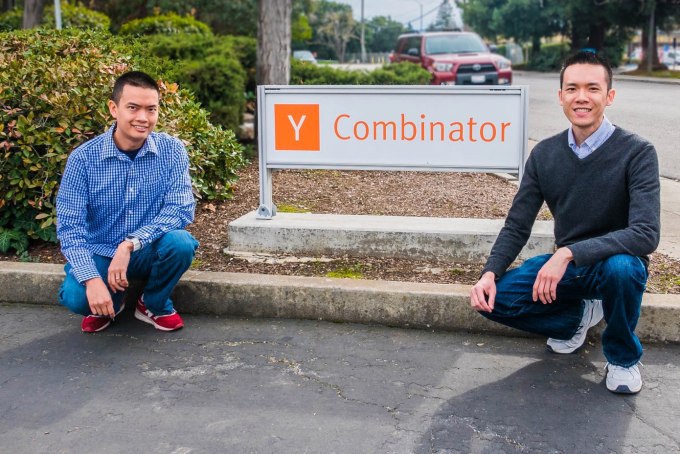
Cognition IP is a tech-enabled patent law firm focused on getting the job done quicker and cheaper.
The startup claims they charge half the price of traditional law firms and that they file patents in 14 days while larger firms spend as much as 30 days getting patents filed. The company did this by building automation tools, like a smart search engine that takes a patent application and finds similar ones. They’ve also automated formatting, and built software that fills out forms for users. The company launched three months ago and is profitable with $200k in revenue.

Mirror AI takes a photo and creates “thousands” of emoji that look like you. A few weeks after launching, they’ve got 300,000 installs.

Tarjimly connects refugees and immigrants with native speakers of their language for help navigating difficult situations, from paperwork to disaster response.
It’s anonymous, free, and works entirely within Facebook Messenger, with more platforms on the way.
Read more about Tarjimly on TechCrunch here.

OurMenu replaces ordering from a waiter with ordering from a website.
Labor costs are huge for restaurants. OurMenu wants to let you order from your phone at your table instead of talking to a waiter, and without downloading an app. You scan a QR code on the table, choose your food, order and pay, and then the food is brought to you. OurMenu plans to charge restaurants $300 per month for the tech, and will aggregate the menu choice data to sell back to them.

Archform is teeth aligner software startup that lets orthodontists create, design and 3D print aligners within their own offices.
The idea is to provide orthodontists with a way to better compete against some direct-to-consumer teeth aligner startups and cut down on the cost of Invisalign.
Read more about ArchForm on TechCrunch here.

Ropeo wants to be the Stitch Fix of Latin America.
The company offers a monthly clothing subscription service with some features optimized for its particular market. The company allows users to try before they buy and takes cash on pickup because credit card use is so low in LatAm. The company believes that they’ll be able to negotiate better deals with partners as they scale and that after clothing, they’ll be able to grow to sourcing different types of apparel.
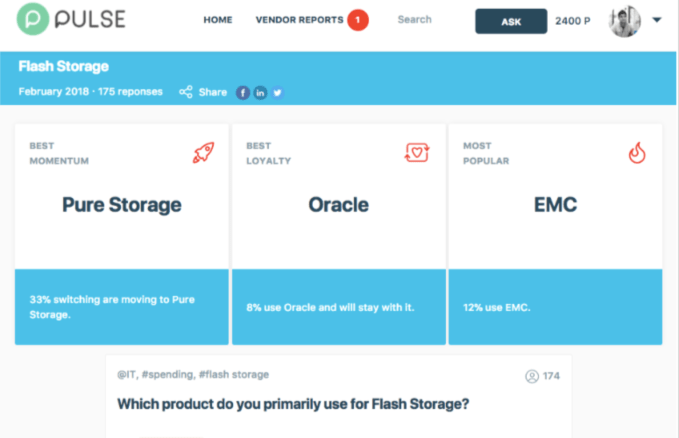
Pulse is trying to crowdsource research and advisory reports by tapping a community of IT execs.
They currently have 3,000+ IT executives on the platform, and say they’re growing by over 100 companies per week. Its reports are free, instead aiming to make money buy connecting IT buyers and vendors.
Read more about Pulse on TechCrunch here.

Playbook is for college students who want to hang out.
It’s an app with 240 beta users at Harvard, 30% of whom use it daily. In March, they organized 101 get togethers and “most the people that hung out and had a great time didn’t know each other beforehand.” It’s available on both iOS and Android.
Read more about Playbook on TechCrunch here.

Dana Cita offers student loans in Indonesia.
Previously, there were no loans in the 260 million-person country where 76 percent of people are unbanked. Dana Cita believes student loans can be the start of an adult’s financial life, and a way to recruit long-time customers for other financial services. It’s originated $100K in loans to 52 borrowers so far. The question is whether after seeing the student loan debt crisis in America, Indonesians will want to take money from a startup.

Tributi wants to build a TurboTax for Latin America.
The startup says that the vast majority of people in Latin America have their taxes prepped by individual accountants rather than using software products. The company says upcoming tax reform across the continent will drive even more traffic to solutions like theirs. The startup says it is growing 25 percent week over week since launch.
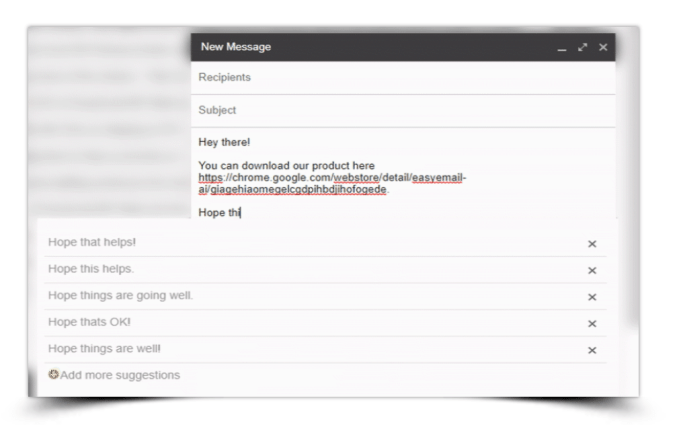
EasyEmail is a Chrome plugin that analyzes your emails finds your most common phrases and autocompletes sentences for you.
So much of the emails that we send feel like they’re being written on autopilot. Wouldn’t it be great if they actually were? For users sending a lot of repetitive sales or PR emails, the service offers a system that will keep you from copy-pasting up a storm and let you intelligently blaze through your emails.
Read more about EasyEmail on TechCrunch Here.

Ben aims to be a unified platform for learning about, buying, selling, and storing cryptocurrency.
With the hundreds of wallets and exchanges floating around in the blockchain ether, it’s easy for novices to get lost in the fray. Ben’s mobile app distinguishes itself from other wallet exchanges by integrating crypto education, using the platform to also deliver news about currencies and offer Q&As related to crypto investing.
Medumo aims to reduce day-of medical procedure cancellations.
Last minute schedule changes can be costly for both the patients and the medical facilities.
But a lot of these cancellations aren’t by choice, but rather because patients forgot to fast or avoid certain foods before a procedure. Medumo offers support over text and email, providing instructions so that the patient is ready when they need to be. For its customers, they say it’s resulted in a 30% reduction in no shows.
Powered by WPeMatico
For the visually impaired, there are lots of accessibility options if you want to browse the web — screen readers, podcast versions of articles and so on. But it can still be a pain to keep up with your favorite publications the way sighted app users do. BrailleVoice is a project that puts the news in a touch-tone phone interface, reading you the latest news from your favorite publications (like this one) easily from anywhere you get a signal.
It’s from SpaceNext, AKA Shan, who has a variety of useful little apps he’s developed over the years on his page — John wrote up one back in 2011. Several of them have an accessibility aspect to them, something that always piques my interest.
“Visually challenged users will find it difficult to navigate using apps,” he wrote in an email. “I thought with text to speech readily available… they would be able to make a call to a toll free number to listen to latest news from any site.”
All you do is dial 1-888-666-4013, then listen to the options on the menu. TechCrunch is the first outlet listed, so hit 1# and it’ll read out the headlines. Select one (of mine) and it’ll jump right in. That’s it! There are a couple of dozen sites listed right now, from LifeHacker (hit 15#) to the Times of India (hit 26#). You can also suggest new sites to add, presumably as long as they have some kind of RSS feed. (This should be a reminder why you should keep your website or news service accessible in some like manner.)
“More importantly,” he continued, “this works even without internet even in the remotest of places. You can listen to your favorite news site without having to spend a dime or worry about internet.”
Assuming you can get a voice signal and you’ve got minutes, anyway. I quite like the idea of someone walking into the nearest town, pulling out their old Nokia, dialing this up and keeping up to date with the most news-addicted of us.
The text to speech engine is pretty rudimentary, but it’s better than what we all had a few years back, and it’ll only get better as improved engines like Google’s and Apple’s trickle down for general purpose use. I’m going to ask them about that, actually.
It’s quite a basic service, but what more does it need to have, really? Shan is planning to integrate voice controls into the likes of Google Home and Alexa, so there’s that. But as is it may be enough to provide plenty of utility to the vision-impaired. Check out TextOnly too. I could use that for desktop.
Powered by WPeMatico
If you play hardcore and competitive games, you want to win, so it would be useful to have someone leaning over your shoulder giving you tips on how to play better. Someone who knows all your moves and behaviors, for instance.
That’s the thinking behind Gosu.ai, which has developed an AI assistant to help gamers play smarter and improve their skills. It’s now raised a $1.9M funding round led by Runa Capital, with participation from Ventech and existing investor, Sistema_VC. Previously, the startup was backed by Gagarin Capital, a new Silicon Valley-based early-stage VC firm focusing on AI investments, which invested in Prisma and MSQRD, which exited to Facebook and Google, respectively.
Gosu.ai provides tools and guidance for users to improve their skills in competitive games. It analyzes their matches and makes personal recommendations. It also helps players prep, suggesting gear sets, starting items and offering ideas on how to take on a particular opponent. The platform currently works with Dota 2, with plans to support CS:GO and PUBG in the near future.
The company was founded by Alisa Chumachenko (pictured), who was the creator and former CEO of Game Insight, a big gaming world player. She says: “There are 2 billion gamers in the world now and 600 million of them play hardcore games, such as MOBAs, Shooters and MMOs. We can help those players reach their full potential with our AI assistants.”
Gosu.ai’s main competitors are Mobalytics, Dojomadness and Moremmr. But the main difference is that these competitors make analytics of raw statistics, and find the generalized weak spots in comparison with other players, giving general recommendations. Gosu.ai analyzes the specific actions of each player, down to the movement of their mouse, to cater direct recommendations for the player. So it’s more like a virtual assistant than a training platform.
In addition, Gosu works in the B2B field, as well, by offering gaming companies a variety of AI tools, for example a predictive analytics.
Powered by WPeMatico
Microbiome pills, gambling for one-on-one video games and potential cancer cures were the highlights from legendary startup accelerator Y Combinator’s Winter 2018 Demo Day 2. You can read about all 64 startups that launched on Day 1 in verticals like biotech and robotics, our picks for the top 7 companies from Day 1 and our full coverage of another 64 startups from Day 2. TechCrunch’s writers huddled and took feedback from investors to create this list, so click (web) or scroll (mobile) to see our 8 picks for the top startups from Day 2.
Additional reporting by Greg Kumparak, Lucas Matney and Katie Roof
Powered by WPeMatico
It’s moved beyond tradition and into the realm of meme that Apple manages to dominate the news cycle around major industry events, all while not actually participating in said events. CES rolls around and every story is about HomeKit or its competitors; another tech giant has a conference and the news is that Apple updated some random subsystem of its ever-larger ecosystem of devices and software .
This is, undoubtedly, planned by Apple in many instances. And why not? Why shouldn’t it own the cycle when it can — it’s only strategically sound.
This week, the 2018 Game Developers Conference is going on and there’s a bunch of news coverage about various aspects of the show. There are all of the pre-written embargo bits about big titles and high-profile indies, there are the trend pieces and, of course, there’s the traditional ennui-laden “who is this event even for” post that accompanies any industry event that achieves critical mass.
But the absolute biggest story of the event wasn’t even at the event. It was the launch of Fortnite and, shortly thereafter, PlayerUnknown’s Battlegrounds on mobile devices. Specifically, both were launched on iOS, and PUBG hit Android simultaneously.
The launch of Fortnite, especially, resonates across the larger gaming spectrum in several unique ways. It’s the full and complete game as present on consoles, it’s iOS-first and it supports cross-platform play with console and PC players.
This has, essentially, never happened before. There have been stabs at one or more of those conditions on experimental levels, but it really marks a watershed in the games industry that could serve to change the psychology around the platform discussion in major ways. 
For one, though the shape of GDC has changed over the years as it relates to mobile gaming, it’s only recently that the conference has become dominated by indie titles that are mobile centric. The big players and triple-A console titles still take up a lot of air, but the long tail is very long and mobile is not synonymous with “casual gamers” as it once was.
“I remember the GDC before we launched Monument Valley,” says Dan Gray of Monument Valley 2 studio ustwo. “We were fortunate enough that Unity offered us a place on their stand. Nobody had heard of us or our game and we were begging journalists to come say hello, it’s crazy how things have changed in four years. We’ve now got three speakers at the conference this year, people stop you in the street (within a two-block radius) and we’re asked to be part of interviews like this about the future of mobile.”
Zach Gage, the creator of SpellTower, and my wife’s favorite game of all time, Flipflop Solitaire, says that things feel like they have calmed down a bit. “It seems like that might be boring, but actually I think it’s quite exciting, because a consequence of it is that playing games has become just a normal thing that everyone does… which frankly, is wild. Games have never had the cultural reach that they do now, and it’s largely because of the App Store and these magical devices that are in everyone’s pockets.”
Alto’s Odyssey is the followup to Snowman’s 2015 endless boarder Alto’s Adventure. If you look at these two titles, three years apart, you can see the encapsulation of the growth and maturity of gaming on iOS. The original game was fun, but the newer title is beyond fun and into a realm where you can see the form being elevated into art. And it’s happening blazingly fast.
“There’s a real and continually growing sense that mobile is a platform to launch compelling, artful experiences,” says Snowman’s Ryan Cash. “This has always been the sentiment among the really amazing community of developers we’ve been lucky enough to meet. What’s most exciting to me, now, though, is hearing this acknowledged by representatives of major console platforms. Having conversations with people about their favorite games from the past year, and seeing that many of them are titles tailor-made for mobile platforms, is really gratifying. I definitely don’t want to paint the picture that mobile gaming has ever been some sort of pariah, but there’s a definite sense that more people are realizing how unique an experience it is to play games on these deeply personal devices.”
Mobile gaming as a whole has fought since the beginning against the depiction that it was for wasting time only, not making “true art,” which was reserved for consoles or dedicated gaming platforms. Aside from the “casual” versus “hardcore” debate, which is more about mechanics, there was a general stigma that mobile gaming was a sidecar bet to the main functions of these devices, and that their depth would always reflect that. But the narratives and themes being tackled on the platform beyond just clever mechanics are really incredible.
Playing Monument Valley 2 together with my daughter really just blew my doors off, and I think it changed a lot of people’s minds in this regard. The interplay between the characters and environment and a surprisingly emotional undercurrent for a puzzle game made it a breakout that was also a breakthrough of sorts.
“There’s so many things about games that are so awesome that the average person on the street doesn’t even know about,” says Gray. “As small developers right now we have the chance to make somebody feel a range of emotions about a video game for the first time, it’s not often you’re in the right place at the right time for this and to do it with the most personal device that sits in your pocket is the perfect opportunity.”
The fact that so many of the highest-profile titles are launching on iOS first is a constant source of consternation for Android users, but it’s largely a function of addressable audience.
I spoke to Apple VP Greg Joswiak about Apple’s place in the industry. “Gaming has always been one of the most popular categories on the App Store,” he says. A recent relaunch of the App Store put gaming into its own section and introduced a Today tab that tells stories about the games and about their developers.
That redesign, he says, has been effective. “Traffic to the App Store is up significantly, and with higher traffic, of course, comes higher sales.”
“One thing I think smaller developers appreciate from this is the ability to show the people behind the games,” says ustwo’s Gray about the new gaming and Today sections in the App Store. “Previously customers would just see an icon and assume a corporation of 200 made the game, but now it’s great we can show this really is a labor of love for a small group of people who’re trying to make something special. Hopefully this leads to players seeing the value in paying up front for games in the future once they can see the craft that goes into something.”
Snowman’s Cash agrees. “It’s often hard to communicate the why behind the games you’re making — not just what your game is and does, but how much went into making it, and what it could mean to your players. The stories that now sit on the Today tab are a really exciting way to do this; as an example, when Alto’s Odyssey released for pre-order, we saw a really positive player response to the discussion of the game’s development. I think the variety that the new App Store encourages as well, through rotational stories and regularly refreshed sections, infuses a sense of variety that’s great for both players and developers. There’s a real sense I’m hearing that this setup is equipped to help apps and games surface, and stayed surfaced, in a longer term and more sustainable way.”
In addition, there are some technical advantages that keep Apple ahead of Android in this arena. Plenty of Android devices are very performant and capable in individual ways, but Apple has a deep holistic grasp of its hardware that allows it to push platform advantages in introducing new frameworks like ARKit. Google’s efforts in the area with ARCore are just getting started with the first batch of 1.0 apps coming online now, but Google will always be hamstrung by the platform fragmentation that forces developers to target a huge array of possible software and hardware limitations that their apps and games will run up against.
This makes shipping technically ambitious projects like Fortnite on Android as well as iOS a daunting task. “There’s a very wide range of Android devices that we want to support,” Epic Games’ Nick Chester told Forbes. “We want to make sure Android players have a great experience, so we’re taking more time to get it right.“
That wide range of devices includes an insane differential in GPU capability, processing power, Android version and update status.
“We bring a very homogenous customer base to developers where 90 percent of [devices] are on the current versions of iOS,” says Joswiak. Apple’s customers embrace those changes and updates quickly, he says, and this allows developers to target new features and the full capabilities of the devices more quickly.
Ryan Cash sees these launches on iOS of “full games” as they exist elsewhere as a touchstone of sorts that could legitimize the idea of mobile as a parity platform.
“We have a few die-hard Fortnite players on the team, and the mobile version has them extremely excited,” says Cash. “I think more than the completeness of these games (which is in and of itself a technical feat worth celebrating!), things like Epic’s dedication to cross-platform play are massive. Creating these linked ecosystems where players who prefer gaming on their iPhones can enjoy huge cultural touchstone titles like Fortnite alongside console players is massive. That brings us one step closer to an industry attitude which focuses more on accessibility, and less on siloing off experiences and separating them into tiers of perceived quality.”
“I think what is happening is people are starting to recognize that iOS devices are everywhere, and they are the primary computers of many people,” says Zach Gage. “When people watch a game on Twitch, they take their iPhone out of their pocket and download it. Not because they want to know if there’s a mobile version, but because they just want the game. It’s natural to assume that these games available for a computer or a PlayStation, and it’s now natural to assume that it would be available for your phone.”
Ustwo’s Gray says that it’s great that the big games are transitioning, but also cautions that there needs to be a sustainable environment for mid-priced games on iOS that specifically use the new capabilities of these devices.
“It’s great that such huge games are transitioning this way, but for me I’d really like to see more $30+ titles designed and developed specifically for iPhone and iPad as new IP, really taking advantage of how these devices are used,” he says. “It’s definitely going to benefit the App Store as a whole, but It does need to be acknowledged, however, that the way players interact with console/PC platforms and mobile are inherently different and should be designed accordingly. Session lengths and the interaction vocabulary of players are two of the main things to consider, but if a game manages to somehow satisfy the benefits of all those platforms then great, but I think it’s hard.”
Apple may not be an official sponsor of GDC, but it is hosting two sessions at the show, including an introduction to Metal 2, its rendering pipeline, and ARKit, its hope for the future of gaming on mobile. This presence is exciting for a number of reasons, as it shows a greater willingness by Apple to engage the community that has grown around its platforms, but also that the industry is becoming truly integrated, with mobile taking its rightful place alongside console and portable gaming as a viable target for the industry’s most capable and interesting talent.
“They’re bringing the current generation of console games to iOS,” Joswiak says, of launches like Fortnite and PUBG, and notes that he believes we’re at a tipping point when it comes to mobile gaming, because mobile platforms like the iPhone and iOS offer completely unique combinations of hardware and software features that are iterated on quickly.
“Every year we are able to amp up the tech that we bring to developers,” he says, comparing it to the 4-5 year cycle in console gaming hardware. “Before the industry knew it, we were blowing people away [with the tech]. The full gameplay of these titles has woken a lot of people up.”
Powered by WPeMatico
Clari — a startup that has built a predictive sales tool that provides just-in-time assistance for sales people close deals and for those who work in the bigger chain of command to monitor the progress of the sales operation — is capitalising on the big boom in interest for all things AI in the business world. The company is today announcing that it has closed a Series B round of $35 million, funding that it will be using to build out its own sales and marketing team and expand its platform capabilities.
The round was led by Tenaya Capital, the VC fund that started its life as a part of Lehman Brothers, along with participation from other new investors Thomvest Ventures and Blue Cloud Ventures, and previous investors Sequoia Capital, Bain Capital Ventures and Northgate Capital. It brings the total raised by Clari to $61 million.
Andy Byrne, the founder and CEO who is a repeat entrepreneur and has been involved in several exits, said the funding closed “definitely at an upround, and much bigger than we thought it was going to be,” but declined to give a number. For some context, Clari, according to Pitchbook, had a relatively modest post-money valuation of $83.5 million in its last round in 2014, so my guess is that it’s now comfortably into hundred-million territory, once you add in this latest $35 million.
The funding comes at an interesting time for AI startups, particularly those aimed at enterprise IT.
When Clari first emerged from stealth in April 2014, the idea of applying AI to solve pain points for non-technical people in organizations was a fairly nascent and still-novel concept.
Fast forward to today, things have moved very fast, as is often the case in the tech world. Now, you can’t seem to move for all the enterprise IT startups that are either using or claiming to use AI in their solutions. There are so many startup hopefuls, and so many organizations looking for the best way to use AI to improve their business and operations, that there are even startups being founded to manage that opportunity of connecting the two pieces together, such as Element AI.
“I’m not saying we were clairvoyant for targeting the idea of using AI for sales in 2013,” Byrne said. “There has been a large macro trend and if you happen to be a small company that is along for the ride. When we first launched, we had this thesis about AI for sales. Now it’s not the number three or two priority for sales teams, it’s number one. It’s everywhere. Businesses want to invest and spend more money on AI and making things more efficient.”
Clari says that its customer base has tripled in the last year, with customers including Adobe, Audi, Check Point Software, Equinix, Epicor Software Corporation, GE, and PerkinElmer.
Clari’s approach for using AI for the sales team comes in two main areas. First, the company’s system is aimed to reduce some of the busywork that salespeople have in maintaining and updating files on people, by bringing in a number of different data sources and using them to provide composite pictures of target companies that salespeople might have had to otherwise compile with more manual means. Second, Clari puts a lot of focus on its “Opportunity-to-Close (OTC) solutions” — a type of risk-analysis for salespeople and their managers to help them figure out which leads and strategic directly would be the most likely to produce sales.
“Working with Clari since inception, we have been impressed with its growth and strong execution,” said Aaref Hilaly, Partner at Sequoia Capital, in a statement. “Clari has fast become indispensable to many of the most successful sales teams, giving them visibility into their most important metrics: rep productivity, pipeline health, and forecast accuracy.”
Indeed, risk and outcome is a smart area to be in: using AI to help model this is a key area of focus in enterprise IT at the moment, according to feedback I’ve had from a number of others in the enterprise world.
“If you have 150 opportunities presented to you as a salesperson, how do you choose 10 where you should spend your time?” Byrne asked. “A more traditional CRM platform has never showcased your risk and outcomes.”
While up to now Clari has focused on providing intelligence on what is already in a company’s account database, the next step, Byrne noted, is to draw on data from around the web, providing completely new business leads to the sales team.
When we last covered a funding round for Clari, we noted that the company’s laser focus on sales was something that made the company stand out for investors: nailing one aspect of a business’s operations without distractions from other parts of the organization and what it could be spending time solving elsewhere (in fact, when you think about it, the very goal that Clari has been aiming to achieve for salespeople through its product).
But four years on, the company is now widening that ambition. It’s applying its AI engine now to help marketeers weigh up the best opportunities for reaching out to prospective customers; and interestingly it sounds like it will also be applying its engine to product development and specifically supply chain management.
Byrne described one customer, a medical device maker, that was encountering “inefficiencies” around what they should build and when to meet market demand. “Now that they can predict and forecast order bookings and revenue targets, and what’s happened is that their supply chain has become more efficient,” he said. “It is great example of how our AI is now being expanded.”
“The Clari team has leveraged its deep AI expertise to build a unique platform that surfaces predictive insights for sales reps, managers, and execs during the opportunity-to-close process,” said Brian Paul, MD at Tenaya Capital, in a statement. “We see a massive opportunity for AI to transform how sales teams operate which is clearly validated by Clari’s customers and the impressive growth the team has achieved.”
Powered by WPeMatico
Microsoft announced the spring update to its Power BI and Power Apps platform today with a significant enhancement, a new common data service that enables companies to build data-based applications from a variety of data sources.
This is part of a wider strategy that is designed to remove some of the complexity associated with gathering, processing and incorporating data into applications.
Microsoft is essentially giving customers access to the same set of tools and services it has used internally to build Dynamics 365, its enterprise suite of tools that includes CRM, marketing automation and field service along with enterprise resource planning tools (ERP).
While the company has been allowing third party developers to build application on the platform for about 18 months with its Power Apps tools, they haven’t been able to take advantage of the data under the hood without some heavy lifting. Microsoft aims to change that with the Common Data Service.

Diagram: Microsoft
“What that service means, practically speaking, is that it’s not only a place to store data, but a model (schema) that is stamped out there with everything you would need to build a business app around [elements] such as contacts, events, customers [and so forth], Ryan Cunningham, Microsoft program manager for Power Apps explained. This allows the programmer to take advantage of pre-built relationships and rules and how they should be enforced without having to code them from scratch.
Cunningham points out that they tried to make it fairly simple to build the apps, while still providing a level of customization and the ability to use Microsoft data or data from another source. That’s where the Common Data Store comes in.
He says that developers can take advantage of the 200 connectors that come pre-built out of the box and connect to all that data you’ve been collecting in the Microsoft products, but they aren’t limited to the Microsoft data. “You can still build custom applications on top of the platform, and get the benefit of the platform we’ve built our tools on,” he said.
The Common Data Store is part of a much broader set of announcements around the spring releases of Dynamics 365, Office 365 and Power BI platforms all announced today.
Powered by WPeMatico
Biotech, robotics, and fintech startups took the spotlight today at Y Combinator’s 26th Demo Day. This batch features 141 total companies from 23 countries, with presentations spread over two days. The house was packed at Mountain View’s Computer History Museum with wealthy investors forced to stand in the back or sit on the floor. Meanwhile, marijuana soda, wind turbine-cleaning drones, and indestructible panty hose startups demoed their products in the break room and parking lot. You can see our favorites here:
Y Combinator has made progress ramping up diversity in its startup school. Thirty-five percent of this batch’s companies are internationally based, 27 percent have a female founder, and 13 percent have an underrepresented minority founder. The 50-person YC team now includes 18 partners, with Eric Migicovsky of Pebble joining to help out hardware companies and explore the accelerator’s opportunities in China.
The question on everyone’s minds is which startups will join the 15 previous ones like Stripe, Dropbox, and Airbnb now worth over $1 billion. But with YC’s portfolio moving beyond social apps and enterprise tools towards hard science innovation, and 18 percent of this batch’s companies coming from health and biotech, many of the software investors seemed a little overwhelmed. We’ll let you choose your favorites from our write-ups of all 64 that pitched on the record today. Check out our top 7 picks from today’s startups, and we’ll have full coverage of Demo Day 2 tomorrow.

Bear Flag is building autonomous tractors. They claim to be able to reduce input by 20 percent and increase production yield by 11 percent. They’re already testing tractors in the field in California. They plan to charge about $4,000 per tractor per month.

A mobile app for building mobile websites. Who would have thought? Universe lets users build a personal portfolio site with the same ease of editing a photo on Instagram. Users can follow other sites, which creates a bit of a Tumblr-like network of personal blogs. Users have already built one hundred thousand sites with the iOS app which has expanded its functionality in recent months to let users build multi-page sites. The app currently has 2,200 paid subscribers paying an average of $3.40 per month to gain premium features on the app.
Read more about Universe on TechCrunch here.
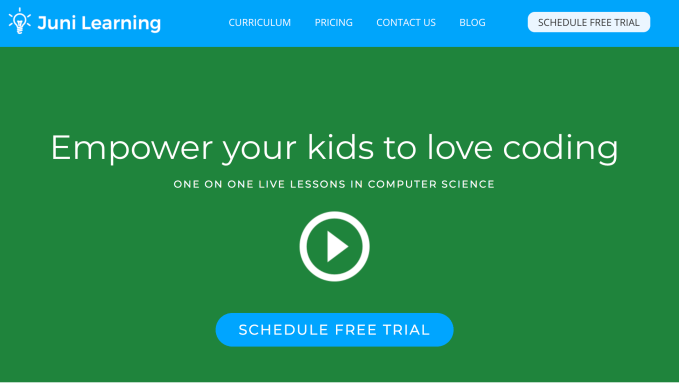
Juni is an online education program for kids that is targeting the $9 billion after-school market. The idea is to start with teaching kids computer science in a virtual, one-on-one setting by pairing them with tutors. It charges $250 per month for once-a-week classes Juni says it’s grown 25 percent month over month in the last six months. The company also says it’s profitable, with a 95 percent monthly renewal rate. Without adequate computer science courses in schools, and the skills becoming clearly critical future employment, Juni could educate the next generation of programmers.
Read more about Juni on TechCrunch here.

There are 25 million digital nomads who move around the world while working on the Internet, and that can make health insurance complicated. SafetyWing offers $37 per month health insurance in 180 countries ($30 extra fee in the U.S.) that covers hospital visits and prescriptions but doesn’t cover preventative treatment or pre-existing conditions like cancer. SafetyWing has partnered with insurance giant TokioMarine to administer the plans. The goal is to build a global safety net for freelancers and digital nomads that the startup hopes will include banking and income protection in the future. The startup will have to convince travelers that health insurance is worth the price and hassle, but with a $15 billion per year market and the number of digital nomads doubling every five years, there’s room for a modernized vision for health insurance.
Read more about SafetyWing on TechCrunch here.

Macromoltek wants to “change the drug discovery process,” by building software that designs antibodies. The startup uses academic research combined with technology to help drug companies. So far, Macromoltek has ten paying customers, generating $50,000 in revenue for 2017. They’ve also secured $500,000 in LOIs (letter of intent) to design new antibodies.

Passerine makes unmanned aircrafts that take off and land like birds. They intend to sell it to companies to use for things like mapping large areas, light weight cargo delivery, lidar surveying, and powerline monitoring.

Visor wants to turn top gamers into even more skilled players. The startup analyzes eSports gameplay footage to help coach users on what gaming skills they need to improve on. The team analyzed 1.3 million minutes of footage in the past 30 days and they boast over 39 thousand monthly active users, growing 52 percent month-over-month since launching at the beginning of the year.

Proven uses data, artificial intelligence and machine learning to design individualized skincare products for consumers. To provide the best skin care products for people, Proven has built a database, which it calls the Beauty Genome Project, that uses 8 million reviews from people in conjunction with AI to understand what ingredients have an impact on people. The idea is to help find people the products that are best for their skin topology.
Read more about Proven on TechCrunch here.
Vena Medical has created what they claim is the “world’s smallest camera” that is designed to help with medical treatments like liver cancer and strokes by looking at patient’s blood vessels. They’ve secured pilots with hospitals and believe there is a $5 billion market opportunity for their single use medical device. “Every patient treated is another camera used.”

Haiku wants to do for apps want Unity did for games. It’s a simple app creation tool, meant for developers and designers to use together. The apps it creates are cross platform across both iOS and Android

Patchd has built a chest-worn device that detects sepsis, the No. 1 cause of death in hospital patients. The idea is that patients would no longer have to stay in the hospital for monitoring, as the device can record and analyze vital signs and send results back to doctors. They currently have a paid pilot in Australia, and are currently testing the device with 20 people. They’ll conduct a clinical trial in 2019. If the product can reliably predict sepsis, patients will be able to get back to the hospital in time if they have complications. Patchd’s device could save tons of money for hospitals and insurers while getting sick people home where they want to be.

Proof helps websites turn their visitors into purchasing customers. As an example, websites can show visitors how many people are currently viewing a product. The idea is for those notifications to help convert people into buyers. Proof currently has 2,700 paying customers, who see an average 10 to 15 percent lift in conversions. Proof’s long-term goal is to personalize the entire marketing funnel.

Openland wants to create a better way for real estate developers to acquire properties. It does this through a slick interface that allows builders to sort through available lands and connect quickly with landowners, evaluate the properties and get through the paperwork. Openland’s co-founder called the fact that 90% of buildable space isn’t for sale the “biggest roadblock for the real estate industry.”
The biggest tech companies in the U.S. — the so-called FAANGs, or Facebook, Apple, Amazon, Netflix and Google — have massive recruiting efforts on university campuses and around the world. But SharpestMinds wants to build a set of tools to help the rest of those tech companies that don’t have those recruiting resources find talent before they get snatched up. SharpestMinds matches up students that apply on their site with companies where they can work on a trial basis, building up that early relationship that could lead to a job down the line.
Read more about SharpestMinds on TechCrunch here.
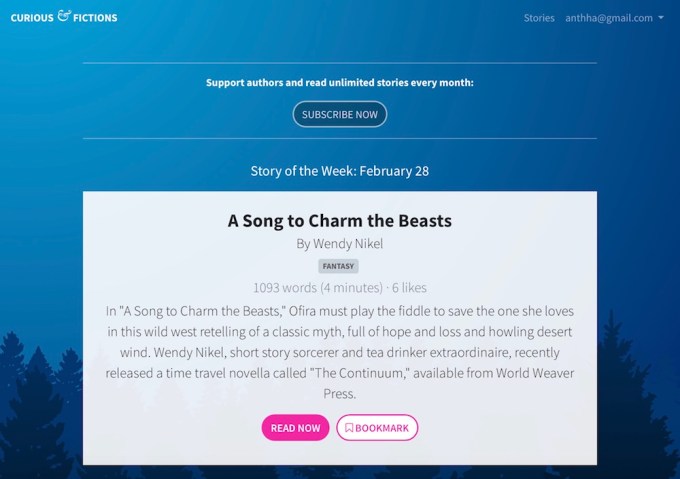
Curious Fictions is an mobile-friendly site where readers can find, read and pay for short stories. You can pay $5, $10 or $15 per month, and then the money is distributed to the authors of the stories that they liked that month. You can also tip authors for individual stories.
Read more about CuriousFictions on TechCrunch here.
Culture Robotics is growing organisms for biotech companies. It claims to have built “the first cloud bioreactor farm” and compare themselves to Amazon Web Services, but for biomanufacturing. Its technology creates bacteria like collagen for beauty companies. Culture Robotics believes its applicable for synthetic biology, microbiome and cellular therapy. So far, they’ve secured three paying customers and are generating $50k in revenue per month.

Qulture.Rocks is HR management for Latin America. They’re have grown about 20% month over month for the past 2 years, and have hit the break-even point.

A bio-tech startup that aims to create a more patient-friendly way to deliver drugs. AesculaTech has invented a temperature responsive material that enables the company to make customized medical devices inside the body. The company’s first use of its technology is going toward the treatment of dry eye syndrome, which the founders say affects more than 20 million people in America. The goal is to become the go-to material used to make medical devices.
Read more about AesculaTech on TechCrunch here.
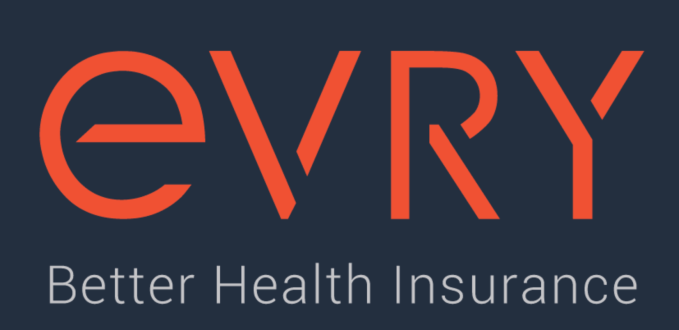
Evry Health wants to take on the employee health insurance market by tackling a specific type of customer. The startup is specializing in working with customer companies that have between 200-1,000 employees. They boast that their product is 20 percent less than competitors and offers enhanced coverage. They’re tackling the $10B Texas health care market when they launch at the beginning of next year.
Aspire provides loans to small businesses in Southeast Asia. Its team of “credit experts” promise to make a decision within two hours and have cash disbursed by the next day. So far, they’ve secured $500k in loans in just eight weeks. They support banks like Citi, Maybank and HSBC.

Sudden makes instant coffee that the company claims is “better than fresh Starbucks” – backing it up with what they say was a blind test in which 8 of 10 coffee drinkers chose their instant stuff. They’re currently in 20 retail stores, and will soon be sold in REI. Their secret sauce, as they explain it: they’ve found a way to make instant coffee without requiring any boiling.
![]()
CoinTracker is a platform to track your crypto across all exchanges, wallets, and even currencies. Today most crypto-enthusiasts try to do this using complicated and bloated Google spreadsheets, so an automated solution has the potential to save a lot of people a lot of time. CoinTracker also has the ability to optimize tax filings by computing capital gains reports using FIFO, LIFO or HIFO accounting.
Read more about CoinTracker on TechCrunch here.

Supermedium is a web browser built natively for virtual reality. The team behind the browser was previously working at Mozilla working on A-Frame defining the WebVR standard which aims to get apps and games off your hard drive and onto the world wide web. Supermedium is working with developers to make their browser the default hub for quick and impactful games and demos. A beta of the app is available now on the Oculus Rift and HTC Vive VR headsets.
Read more about Supermedium on TechCrunch here.

Sheerly Genius manufactures and sells rip-proof, snag-proof and “lifeproof” pantyhose that last up to 50 wears. The pantyhose are made with the same type of fiber found in bulletproof vests and climbing equipment. Right now, Sheerly Genius sells basic black, sheer pantyhose. Down the road, Sheerly Genius plans to move into the “nude” option, which entails a number of different colors.
Read more about Sheerly Genius on TechCrunch here.
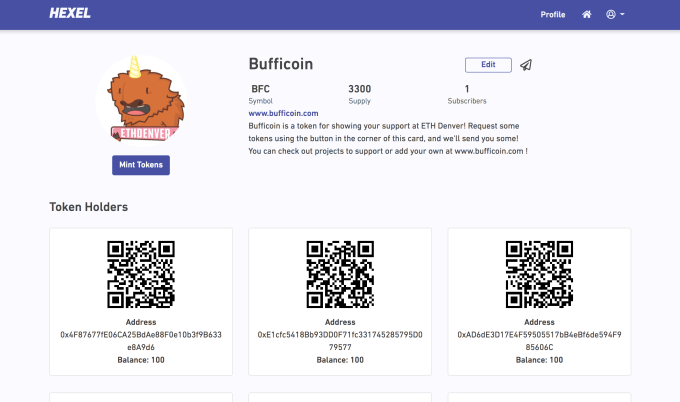
Hexel lets any web community launch its own immediately-usable cryptocurrency. The idea is that sites could reward their own users for engagement or let them buy tokens for different purposes, but that they could also trade them for other sites’ currencies on the Hexel exchange. For example, Quora could reward you tokens for having the top answer to science questions. Those could potentially be used to promote your own answers or questions, or you could trade them in via Hexel for hypothetical Reddit tokens that would let that user post on science subreddits reserved for experts. Hexel will earn a fee when use use its exchange. While 300 currencies have been created since Hexel’s launch six weeks ago, the startup will have a tough time persuade popular web platforms to complicate themselves with tokens. Most people still only understand cryptocurrencies as stores of value like Bitcoin, so lots of user education would be required too.
Read more about Hexel on TechCrunch here.

A mental health benefit platform for employers and their employees. Modern Health connects employees to a healthcare professional or digital tools to address things like depression, anxiety
Since launching four weeks ago, Modern Health has posted $37,000 in annual recurring revenue. So far, employee engagement comes in at 30 percent.

One in five American households now have a new family member in the house named Alexa, Siri or Google. Volley wants to build a platform for voice-based gaming on home assistant hardware. The company has the number one game for Alexa and has 900k MAUs since they launched last April.
Read more about Volley on TechCrunch here.
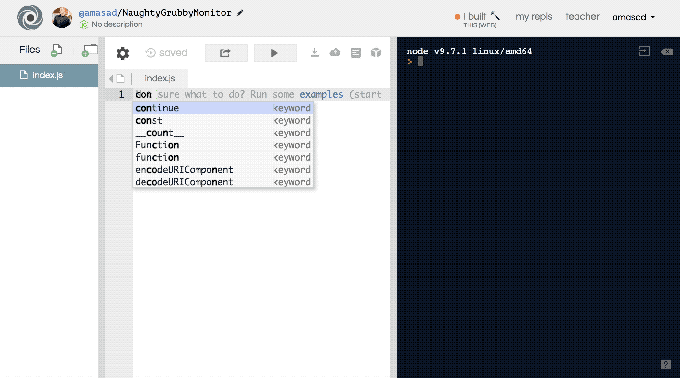
Repl.it is an instant serverless computing platform. It lets you write and deploy apps for your browser. They claim to be the “easiest way to start coding,” letting users build “complex applications with thousands of lines of codes.” Repl.it believes its cloud platform is perfect for building games and other interactive programs.
Read more about Repl.it on TechCrunch here.

“Borderless shopping for Asia”. Trusu says that getting Western products in Asia is often difficult, requiring you to use a package forwarding service at a costly premium. They import products in bulk once a week, allowing their prices to be up to 75% lower than alternative services.
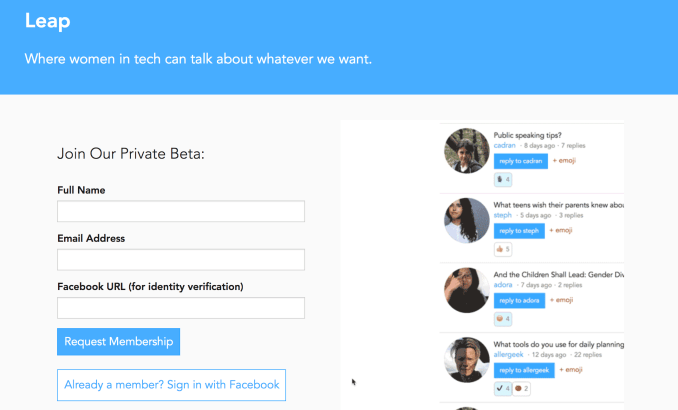
Leap is a private social network for women in tech. Designed by and for women, Leap could help people find investors, co-founders, mentors, jobs, and more. Leap uses a real names but allows some anonymous posts, and employs a light touch in moderation but with the perspective on abuse lacking at most male-run social networks. Leap now has 2000 users, but has plenty of room to grow with 4.8 million women in tech in the U.S. Social networks do have outstanding lifetime value if they can retain their users and understand what they buy.
The question will be whether one-off, niche social networks can succeed in the face of massive networks like Facebook and its Groups feature by focusing on thwarting abuse and creating a more civil discussion space. The private beta for Leap is now accepting signups.

A life science company that develops skin patches for drug delivery. Skin patches work by allowing the drugs to deliver through your skin, directly into your bloodstream. That means Avro’s skin patches eliminate the need to swallow pills and involve the GI tract.
Avro makes patches for hundreds of drugs, like Benadryl, Zyrtec, Claritin and Aerius. Avro’s research has shown effectiveness in terms of relieving seasonal allergies. Avro says it’s on track for FDA approval by Q2 of 2019.

Sourcify wants to be the Flexport for product sourcing by tackling how companies get in touch with manufacturing pipelines. They want to take manufacturing sorting out of Excel and stick into its software. The startup says that they can add visualization and transparency to the industry as it has already “pre-vetted” more than 700 factories.

Lawyaw builds “intelligent templates for law firms”. Built by an ex-law firm partner and an ex-Google engineer, it uses natural language processing to create new legal documents from a lawyer’s existing documents, allowing it to be re-used later as a template. 800+ lawyers are currently using the service, with 23,000 templates made so far.
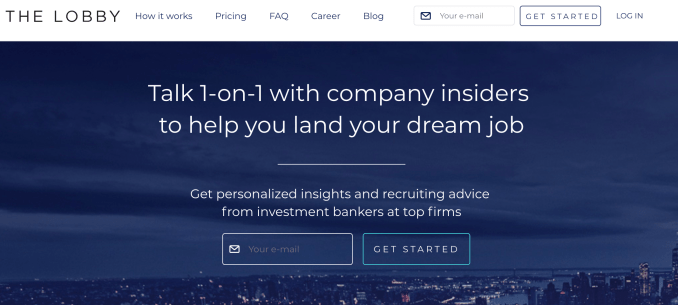
The Lobby helps job applicants secure one-on-one calls with company insiders. With resume critique and mock interviews, the startup helps job seekers get advice “from a real human who has the job they want.” They already work with insiders at top investment banks like J.P. Morgan and Barclays and have a $100,000 gross merchandise volume (GMV) run rate, taking 45% margins on the calls. With 40 million Americans looking for high-skilled jobs, they hope that this is a $2.4 billion market opportunity. The Lobby “turns employes into talent scouts.”

Vathys is an artificial intelligence startup that makes a deep learning chip that is supposedly 10x faster than the competition. Computation accounts for 8 percent of power consumption of a chip. The rest is data movement, according to the founder. By addressing data movement, Vathys has created a processor that is 10x faster than the competition. The company already has a purchase order for $50K.

California Dreamin’ is a cannabis-infused THC sparkling juice beverage designed to get you a little high the same way a beer gets you a little drunk. Marijuana legalization has opened the door to a massive new industry, including psychoactive products for people who don’t want to smoke anything. Each bottle retails for $8 to $10, and contains 10mg of energizing sativa THC — one standard dose. It tastes sweet but with a hint of earthy plant notes, and you can drink a whole bottle without ending up locked into your couch like some competitors that put 100mg in a bottle. If California Dreamin’ can appeal to baby boomers and soccer moms looking to avoid the hangovers of alcohol while still imbibing something to relax, the business could blossom. California Dreamin’ is now delivering its first cases to recreational dispensaries in SF after selling $10,000-worth in its beta program. The legal cannabis business is $10 billion per year and growing 30 percent each year, but California Dreamin’ wants to nab part of the $210 billion alcohol market by getting people to switch to cannabis.
Read more about California Dreamin’ on TechCrunch here.
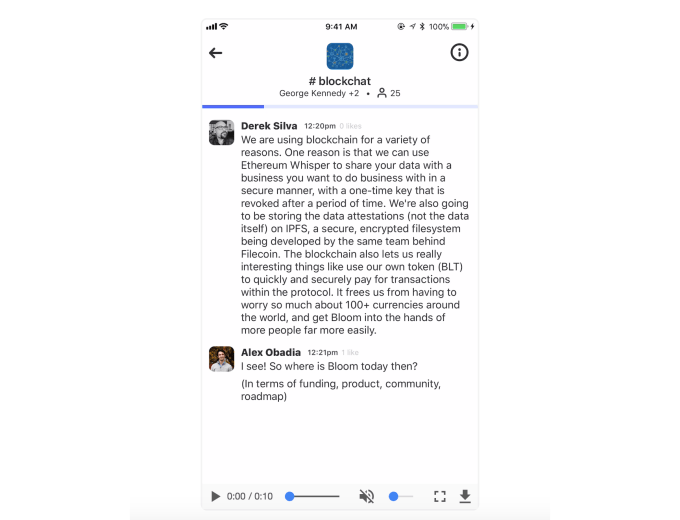
Rhythmm wants to take live chat conversations from experts and interesting people and let others follow along. The startup wants to take the insights people are getting from chat groups on Telegram and remove all the noise with their own platform. Only people who have been invited by the chat creator can participate, everybody else just follows the conversations.

Algosurg has built algorithms to simulate surgeries. They believe that “robotics is the future of surgery,” and have developed something called Tabplan3D, which uses cloud technology instead of Xrays to help orthopedic surgeons prepare using a 3D virtual surgery plan. They have four patents filed and FDA approval in process.

OSIMple helps build automated infrastructure inspections — in other words, software that helps optimize the inspection of things like roads, railways, bridges, and dams. 500 different bridges were inspected with their software in the last 6 months, and they have letters of intent from 2 large companies.

Orangewood Labs uses massive 3D printer-esque wood-cutting robots to make on-demand furniture. With no inventory, Orangewood avoids the costs of unsold goods or massive warehouses. It crowdsources 3D designs which it can tweak into different styles, colors, and sizes to fit your home. As more of commerce moves online, customers no longer expect to be able to test everything in person before they buy. Perhaps Orangewood will use augmented reality to virtually try its desks and chairs in your home. The startup has already scored $2 million in orders.
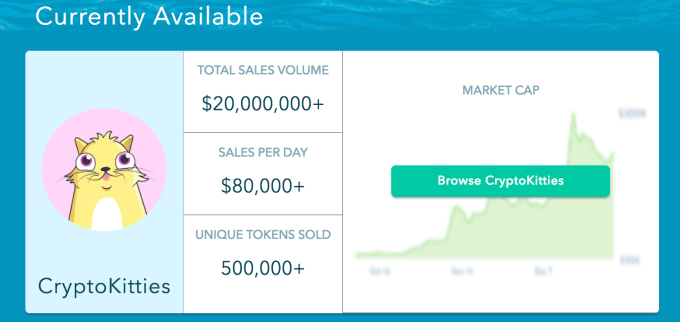
OpenSea is a peer-to-peer marketplace for buying, selling and discovering crypto assets and collectibles. Just as Coinbase operates as an exchange for cryptocurrencies, this is a marketplace for all other asset types on the blockchain, like software licenses, collectibles, Cryptokitties and other digital goods on the blockchain. In the last two months, Open Sea has done $500,000 in ethereal volume.
Playing Viral is an Indonesian startup that assists online publishers through delivering leads for advertisers. The team works with surveys over visual ad units and can analyze the text to ensure that users are getting surveys in their language and dialect.

Spun out of bioengineering research at UC Berkeley, Correlia Biosystems is able to analyze microsamples of blood, making it “easier to get more data from a tiny drop.” They claim to be “opening the space to next gen protein detection,” by reducing the time and cost for quantifying proteins for pharmaceutical applications. So far, they have brought in $55,000 in revenue in three months and have also secured $9.3 million in LOIs. Correlia believes this is a $11.6 billion market opportunity.

Sqreen is a tool that sits in your web app and tries to prevent attacks. It watches the behavior of users within your app to identify and block against SQL injections and cross-site scripting attacks. It currently works with apps built on Ruby on Rails, NodeJS, and Python.
Sqreen was in the TechCrunch Disrupt SF Battlefield in 2016. You can read more about Sqreen on TechCrunch here.

Voice assistants may be the home product du jour, but Piccolo wants you to control your smarthome with your hands. No, not like you already do, but by using gestures. Point at a light to turn it on, scrub through a video on your TV by moving your hand in front of you etc etc. The company is building a smart camera that can map a user’s skeletal geometry and see what the user wants to control.
Read more about Piccolo on TechCrunch here.
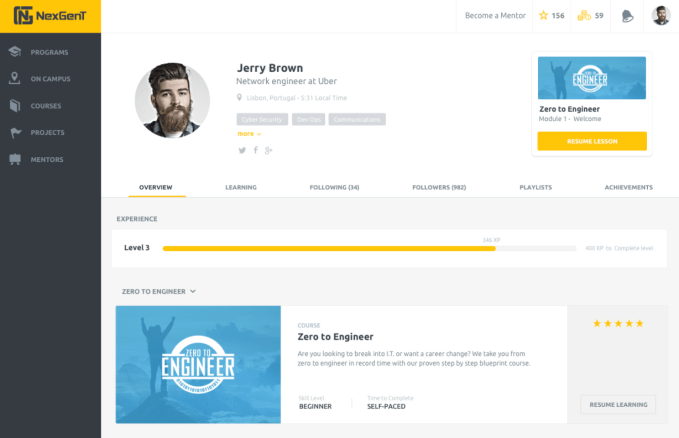
Bootcamps became insanely popular in the mid 2010s, but there’s been a big shakeout since then — and NexGenT hopes to take the fundamentals of getting an engineer production ready, but with a different approach. Rather than try to have somoene ready to be a full-scale developer in 3 months, NexGenT focuses on just certificate programs to get people ready to be network engineers. The process is longer, but hopefully more robust as well.
Read more about NextGenT on TechCrunch here.

Voicery synthesizes ultra-realistic computer voices that can use natural emotion and inflection, and whisper or joke. 70 percent of people prefer its voices to Amazon Alexa’s. Voicery analyzes hundreds of human voices to train deep neural networks that power its product, rather than trying to train a computer to mimic a single specific voice. Voicery could be used to generate voice overs, read the news, dub television shows and more. It’s already got a letter of intent for $300,000 to make audio books. With more speech-enabled devices coming on the market every day, there could be a big market for giving different brands their own voice.
Read more about Voicery on TechCrunch here.

A marketplace for endurance events, like 5ks, half-marathons and other races. Let’s Do This says revenue has doubled every two weeks since launching. So far, it has partnered with over 850 races, like IronMan and The Color Run.

Flexport showed how ripe the freight industry is for disruption, Shone is retrofitting old cargo ships with its proprietary technology that allows them to deliver shipping containers autonomously and by remote control.

Quit Genius is an app “that delivers personalized therapy to help people quit smoking.” It helps people identify the reasons they smoke and hopes to help them overcome them. They work with companies including a “technology giant” to pay for Quit Genius, in order to help employees. The startup says there is a $10 billion market for people trying to quit smoking, and wants to expand to alcohol and other addictions.
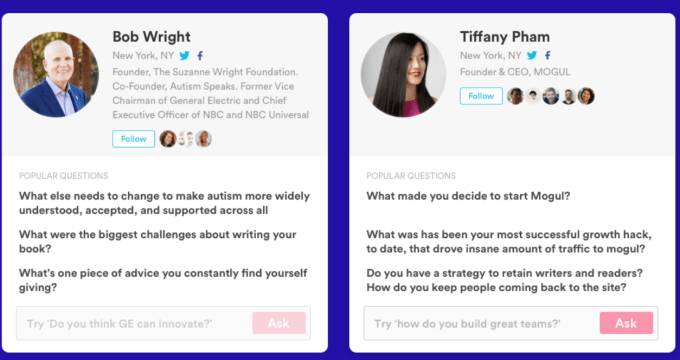
Molly uses AI to generate Q&As for people who are frequently asked the same questions — celebrities, field experts, etc.
Read more about Molly on TechCrunch here.
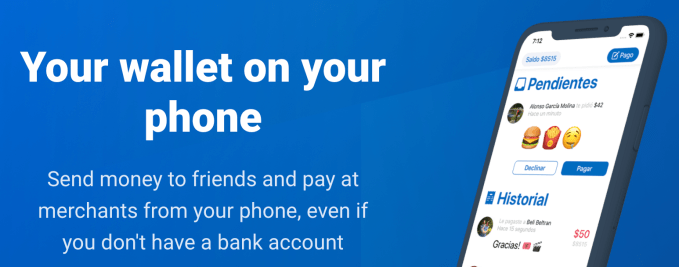
Flint is a mobile banking solution for Mexico that lets people pay merchants and friends using scannable QR codes. And for the 56 percent of the population that is unbanked, Flint lets users deposit or withdrawal cash from their app’s account at local shops and restaurants. It’s essentially a crowdsourced ATM. Flint is growing payment volume 5X per month as it tries to do what WeChat and Alipay did for China.

A video platform for relaxation. Tingles is an iOS and Android app designed to help you relax and fall asleep. It’s a video genre called ASMR, which is supposedly growing 130 percent year over year. It currently has 60,000 monthly active users who view about 1.3 hours worth of content every day.
Read more about Tingles on TechCrunch here
Runa HR wants to help small businesses in Latin America by automating payroll. The startup is pricing its product the same as US alternatives, but is seeking to strike a balance in Latin America between expensive, inefficient solutions and those that don’t solve all of their employees needs. The team at Runa believes it can eventually take over the entire software business for small businesses in Latin America.

Aerones has built drones that clean wind turbines. They believe this is a safer and more efficient alternative to humans cleaning them and that this is a $1.4 billion market opportunity. They have heavy lifting drones that they hope will eventually clean buildings and have applications for other industries like oil, gas and solar. Aerones says that so far it has received 7 LOIs for 5000 cleanings, a promise of $5 million in revenue.

Snackpass is a food ordering app focusing on takeout rather than delivery. They’ve been running a field test at Yale, where they say 50% of students are monthly customers. There’s a social network-driven loyalty card aspect that they say is driving growth.

Reverie Labs uses machine learning to scan public molecule research, modify and develop its own molecules, and license the drugs they create to big pharmaceutical companies. The startup claims it can sell molecule licenses for $100 million, and has already signed a milestone deal worth up to $87 million. It expects to have 3 drugs ready for clinical trials by the end of 2019, which is much faster than most pharma companies take. The Harvard and MIT team plan to use their engineering-focused startup identity to recruit ML talent the pharma giants can’t match. And eventually, it wants to go full-stack and sell its own medicines.
Read more about Reverie Labs on TechCrunch here
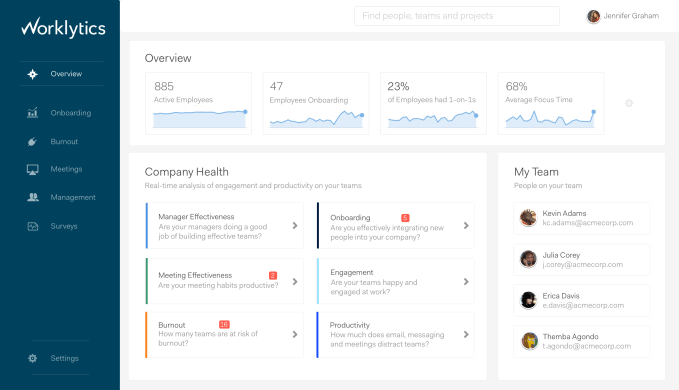
Worklytics wants to get rid of those boring team meetings, and the right place to look is probably at the management layer. The tool keeps track of the kinds of distractions that employees might get, as well as whether the right processes like one-on-one reviews and code collaboration, happen. It doesn’t track specific employees, but it uses the data it gleans from teams to figure out what works best to help companies run more efficiently.
Read more about WorkLytics on TechCrunch here.
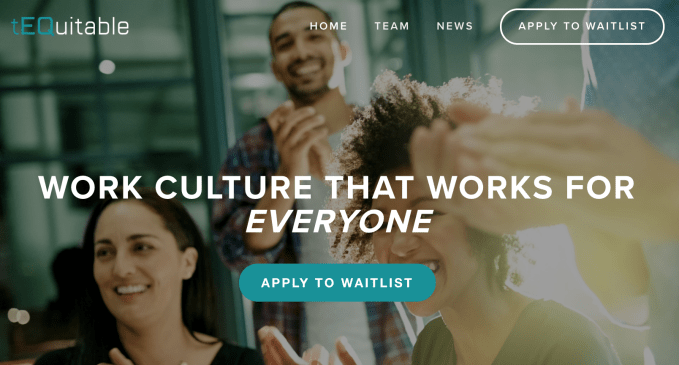
A third-party, confidential software platform to solve workplace harassment. If an employee is feeling discriminated against or harassed they can open up the app to talk to a professional advisor, then create an action plan to either address the issue or file a formal complaint.
Then tEQuitable will aggregate the data and come up with ideas to fix the company culture. The company’s clients include Twilio, GitHub, Obvious Ventures in pilot programs worth $120,000.
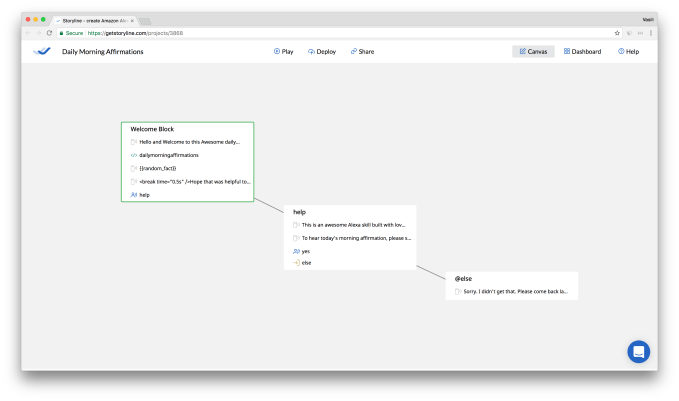
Storyline wants to make it easy for people to build content apps for the Alexa platform without any coding. Storyline wants to power content across Alexa the same way YouTube powers video, they say. The startup’s apps already have 180 thousand monthly active users across 500 apps.
Read more about Storyline on TechCrunch here.

CaptivateIQ is software to calculate sales commissions. They believe that 80% of commissions have errors and there’s an opportunity to help companies get it right. They’re starting with the tech industry, but believe this is ultimately a $1.5 billion market opportunity. Beyond commissions, they think they can also help companies increase revenue.

Cricket farming for now may be an art, but Ovipost — starting with the rearing process — wants to turn it into a science. By first working to optimize hatching and egg yield, Ovipost wants to lower the labor costs to produce crickets, which could then be turned into direct consumer food sources or even feed.
Read more about OviPost on TechCrunch here.

Veriff wants to be Stripe for online identity verification, handling the processing of drivers licenses, passports, and IDs for websites. They did $60k in revenue in February, and are currently profitable. They charge ~$1 per verification.

ObserveAI is AI-powered quality assurance for call center agents. They use natural language processing to determine how call center agents are interacting with customers and offer up suggestions as to what they might be doing better. The company charges $1000 per customer service agent per year.
Powered by WPeMatico
Bandai Namco Entertainment announced the latest entrant in its series of Dragon Ball games this week. Dragon Ball Legends is a player versus player (PvP) mobile game that has players from all over the world battle with each other in real time by using their move cards. From all I’ve seen, it looks like a pretty fun game, though I know nothing about Dragon Ball and I have an unreasonable disinterest in card-based games. What made me perk up, though, was when I heard that Bandai Namco opted to use Google’s Cloud Network to host all the infrastructure for the game and that one of the main components of this system is Cloud Spanner, Google’s globally distributed database.
To make a real-time game work at all is hard enough, but Bandai Namco wanted players from all over the world to be able to play against each other. There’s a reason most games distribute players into regions based on their geography, though. In a real-time game, latency matters, as every hardened PUBG player will tell you, and the farther you get away from the game server, the higher your latency will likely be.
As Bandai Namco’s Keigo Ikeda and Toshitaka Tachibana told me ahead of the launch, the team opted to divide every game second into 250ms intervals, so while the game looks like it’s real-time to users, it’s actually a really fast turn-based game at its core. “Technically speaking, to the user’s eye, it’s real-time, but on the server, players have their own turn,” said Tachibana. By opting for the Google Cloud Platform and Cloud Spanner as the database to keep track of all moves, the average latency the team has seen during its tests is 138ms, which allows for plenty of wiggle room.
To make all of this work, the team spent almost two and a half years building out the necessary infrastructure, and Tachibana admitted that the team learned quite a bit more than it expected about network latency. During early tests, the team wanted to create a peer-to-peer connection to have players battle each other, for example, but depending on the carriers, the difference in user experience varied too much. The team also had to learn how to best route traffic between players, something that most gaming developers don’t really have to think about most days. “We were pretty frustrated with everyone who wasn’t Google,” said Tachibana.
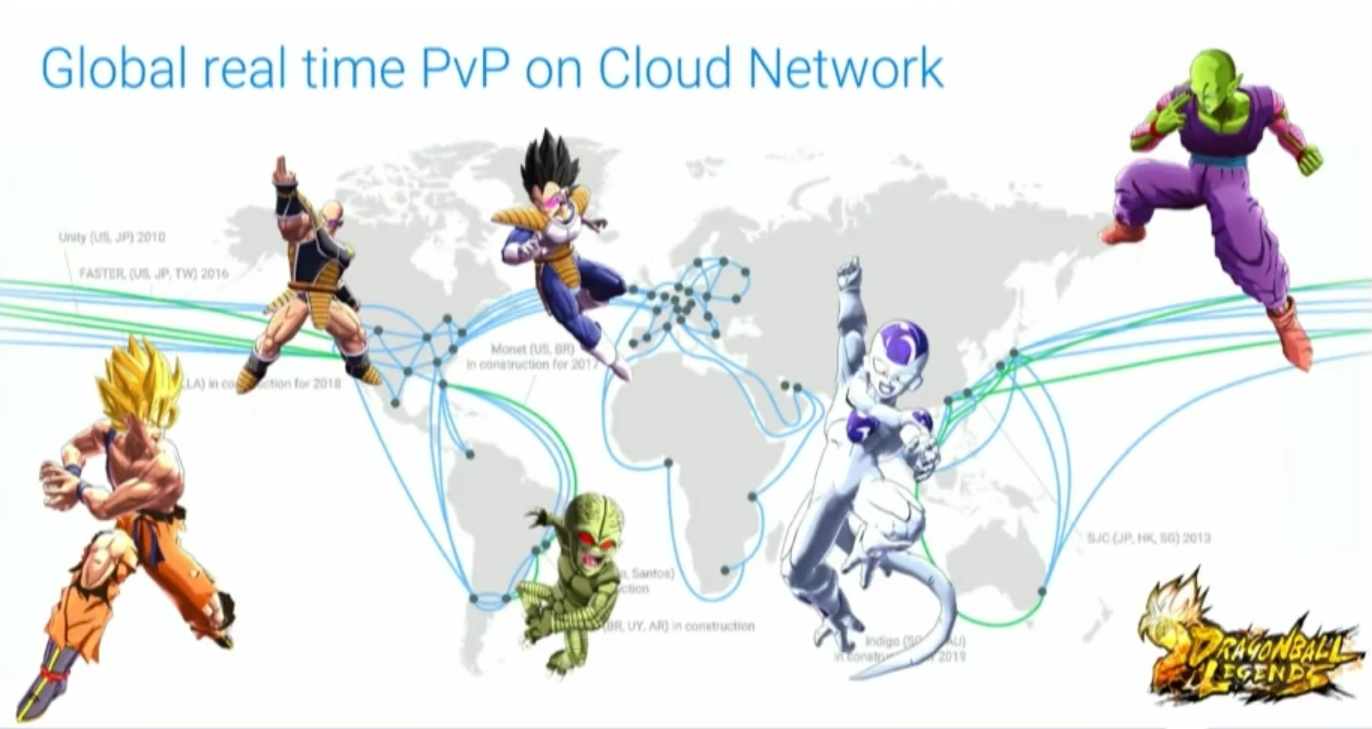
Indeed, Cloud Spanner is the core service here, and the team says it opted for it because it gives it a globally distributed strongly consistent database to work with. Because any change propagates across the global network within milliseconds, Cloud Spanner is actually a really interesting option for game developers who need low latencies and a ground truth that can be distributed between a global player base. Cloud Spanner is not a cheap service, and the team acknowledged as much, though, as Google Cloud Director of Solutions Miles Ward noted, providing the service isn’t cheap either. “Spanner does things from a consistency standpoint that you can’t get from anybody else, so it’s a place where we have to spend more, too,” he said (and before my friends at Microsoft email me: yes, Cosmos DB also offers features that are comparable to Cloud Spanner, as well as a wider range of consistency options).
The Bandai Namco team also noted that Google’s vast private network was another major factor behind its decision. Because Google owns its own network, the data can jump between fewer networks to reach both the central database and the opposing player.
To make Dragon Ball Legends run smoothly, the team is also using BigQuery to manage and analyze its data, as well as some of the company’s Firebase services.
Tachibana noted that Bandai Namco is placing a big bet on this new game, but that the team also wanted to create a benchmark for what a globally distributed PvP game can look like. “We hope that when other developers look to a similar gameplay, they’ll say that it’s hard to top,” he said. “And also, from a technical side, we know that the people who are part of the industry will understand how amazing it is to realize this entire process.”
If you are not a developer and just want to play a new PvP Dragon Ball game, I’m afraid you’ll have to wait a little bit longer, though. The game will arrive in Apple’s App Store and the Google Play Store later this year.
Powered by WPeMatico